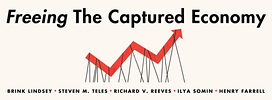In his response essay, Richard Reeves helpfully steers our attention to the inequality that both underlies and flows from disparities of income, wealth, and status: inequality of power. The power to direct the course of one’s own life, free from the arbitrary power of others: this is the central promise of liberal democracy. To make good on that promise, a truly liberal politics must work to ensure that power remains broadly diffused. (And if Reeves’s way of using the world “liberal” would just catch on, the jerry-rigged “liberaltarian” could be consigned to the neologistic scrap heap.)
A special threat arises when economic power is translated into political power, which is then channeled back to entrench and augment economic power—and on and on in a vicious circle. This is the doom loop of oligarchy, and The Captured Economy offers a warning that such dynamics are now under way in the United States. Indeed, they are sufficiently far along that economic dynamism has been noticeably throttled and trust in governing institutions badly battered.
Which raises the question of why. Given that rent-seeking is endemic to democratic capitalism, why is its distributional thrust now so overwhelmingly regressive? In the era of activist government that ran from the New Deal to the Great Society, rent-creating policies could be found in abundance, but their effect was usually to redistribute income downward or sideways. Why is that kind of government intervention less common today, and why are policies that create enormous windfalls at the lofty peak of the income distribution so much more widespread?
This is not a question we sought to answer in The Captured Economy, but it’s been on my mind a lot since the book came out. And I can’t escape the conclusion that the decline of unions is an important part of the answer. Not unions as agents of collective bargaining, but unions as political actors. Organized labor exerted a powerful influence on behalf of government policies to help workers and the less well-off, and it was a strong source of support for the Democratic Party and its general orientation toward the economic interests of the working class. (For some empirical evidence on the political impact of unions, see here and here.) As the percentage of workers represented by unions has nosedived, so has unions’ political clout. Since nothing has emerged in their stead to play a similar political role, it is unsurprising that policymaking has become relatively more responsive to the interests of the well-to-do.
I have come to this conclusion reluctantly, as I believe that American-style collective bargaining had overwhelmingly negative effects on the industries where it took hold and I strongly disagree with many of the economic policy positions championed by Big Labor back in the day (trade protectionism and restrictions on immigration in particular). But writing The Captured Economy (and, in particular, learning from Steve in the process) has convinced me that imbalances in representation (not only because of Olsonian organizational symmetries, but also as a result of the decisionmaking venue and differentials in “policy image”) are at the root of many policy dysfunctions. It’s really hard to get policymaking to track the broad public interest if participation in the process is dominated by narrow interests on one side of the question.
Accordingly, I’m increasingly interested in figuring out some way to improve the representation of ordinary workers and citizens in the policymaking process. A proposal by Benjamin Sachs of Harvard Law School for “unbundled unions” that focus only on political activity (as opposed to collective bargaining) is an intriguing effort to push in this direction. Perhaps there are better answers, but I no longer have any doubt that the question is important.

